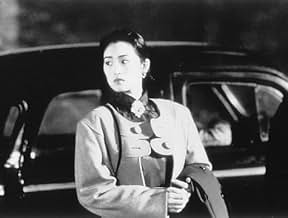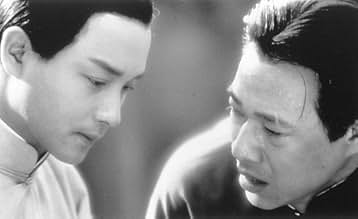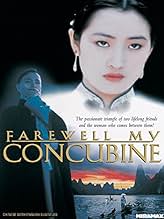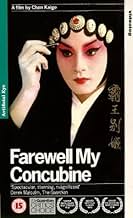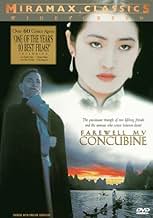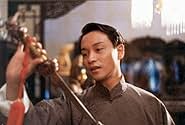IMDb RATING
8.1/10
36K
YOUR RATING
Two boys meet at an opera training school in Peking in 1924. Their resulting friendship will span nearly 70 years and endure some of the most troublesome times in China's history.Two boys meet at an opera training school in Peking in 1924. Their resulting friendship will span nearly 70 years and endure some of the most troublesome times in China's history.Two boys meet at an opera training school in Peking in 1924. Their resulting friendship will span nearly 70 years and endure some of the most troublesome times in China's history.
- Nominated for 2 Oscars
- 24 wins & 12 nominations total
Zhenxiang Fei
- Shitou as a Child
- (as Yang Fei)
Featured reviews
I've seen this movie more times than I can count and I cry every time. I first saw it in the theater in 1993 and I was rooting for it to win Best Foreign Film Oscar, but it lost to the far inferior Belle Epoque (Spain). As to the person who wrote that this film made Cheng Dieyi seem like he was made to be gay because of abuse, I think you need to take another look. To my mind, Dieyi seemed to be infatuated with Shitzou as soon as he got there. However you look at it, this is a film that has great performances all around. I especially loved Leslie Cheung as the adult Cheng Dieyi (requiem eternem Leslie, 1956-2003), not to mention Gong Li. An excellent film, but be forewarned: it's almost three hours long. 10/10
The film paints the story of two actors, from their first encounter at school in the Twenties through their success as stars of the Peking Opera, difficulties during the Japanese occupation, the Communist takeover in 1949 and the traumas of the Cultural Revolution in the Sixties
For the so-called Fifth Generation of Chinese filmmakers, the film touches new ground on two fronts In the first place, though it does not avoid from acknowledging the sufferings under the old regime, it takes an embittered view of Communist society and of the Cultural Revolution specifically
The two friends, Xiaolou and Dieyi, adopt a young man, Xiao Si, who becomes one of the Red Guards and quickly informs the political sins of his benefactors
Second the film is a love story of a rare kind Dieyi is a homosexual and suffers rejection when Xiaolou begins an affair with Juxian (Gong Li), a gorgeous prostitute The personal conflict of each character is the heart of this exceptional movie
For the so-called Fifth Generation of Chinese filmmakers, the film touches new ground on two fronts In the first place, though it does not avoid from acknowledging the sufferings under the old regime, it takes an embittered view of Communist society and of the Cultural Revolution specifically
The two friends, Xiaolou and Dieyi, adopt a young man, Xiao Si, who becomes one of the Red Guards and quickly informs the political sins of his benefactors
Second the film is a love story of a rare kind Dieyi is a homosexual and suffers rejection when Xiaolou begins an affair with Juxian (Gong Li), a gorgeous prostitute The personal conflict of each character is the heart of this exceptional movie
'Farewell My Concubine' is, in a word, excellent.
Though often portrayed as haunting and disturbing, it's also quite touching at times... attributed largely to the outstanding emotional performances by the film's lead cast. Hands down, Chen Kaige has directed one of the most beautiful films involving the fall of the great Imperial China... and subsequently... the friendship of two of China's greatest leading opera performers.
Leslie Cheung's role as Cheng Dieyi, the tormented 'concubine' of the story, is absolutely astounding, and is probably one of his greatest performances to date. Fengyi Zhang plays well opposite Cheung, and Gong Li is fantastic as always. The production sets are superb, as are the costumes and cinematography.
Definitely a must see for all fans of foreign cinema, and certainly worthwhile for all newcomers.
10 out of 10
Though often portrayed as haunting and disturbing, it's also quite touching at times... attributed largely to the outstanding emotional performances by the film's lead cast. Hands down, Chen Kaige has directed one of the most beautiful films involving the fall of the great Imperial China... and subsequently... the friendship of two of China's greatest leading opera performers.
Leslie Cheung's role as Cheng Dieyi, the tormented 'concubine' of the story, is absolutely astounding, and is probably one of his greatest performances to date. Fengyi Zhang plays well opposite Cheung, and Gong Li is fantastic as always. The production sets are superb, as are the costumes and cinematography.
Definitely a must see for all fans of foreign cinema, and certainly worthwhile for all newcomers.
10 out of 10
I have seen this movie only once but it left an indelible impression on both me and my wife. It is a beautiful film with gorgeous photography, invisible direction and fantastic acting. What struck us most about this film was how many levels it had. It was a story about politics, love, life, faith, all rolled into one exceptional package. Yet none of these messages are hammered into you. They just flow over you in well-timed waves. Many of these Chinese movies are so interesting because of their unique perspective. It's wonderful to immerse yourself in a great film from a different culture. The many points of beauty in this movie are subtle, delicate and drenched in China's magnificent history. You have to experience it for yourself to understand, and once you do you'll fall in love with the world of Chinese cinema.
I finally got a chance to see "Farewell my Concubine." I'd been anxious to see it since its initial release in 1993. It surprised me in its depth and technical skill.
Three points make this film outstanding. The first is the technical skill of the director and the luscious taste of the director of photography. The entire film is a feast for the eyes, taking full advantage of elaborate costumes and exotic locations. The second strength is in the actual storytelling. The plot is a fascinating tragedy, it feels almost Shakespearean. The acting is nothing short of incredible. Some of China's finest actors demonstrate their ability to carry a story that covers 52 years. Normally, these two strengths alone would be reason enough to see a film, but "Farewell my Concubine" succeeds in satisfying one more category (the bain of any epic): historical accuracy.
"Farewell my Concubine" is exceptionally accurate in portraying the monumental changes that were sweeping China at the time. The film doesn't just treat these events as background events, but drags them right into the plot and pins the characters into their surroundings. This is interesting when you consider that the story takes place in the Peking Opera, not the most likely place for these events to have effect. Instead, as we see the new China emerge, we watch these vestiges of old society fall, and the work of all involved make this transition an achievement to behold. The power of this film was not missed by Chinese censors who banned, removed, and then banned the film again several times over -debating whether or not its artistic brilliance was worth subversive portrayals of suicide and homosexuality. Unlike "The Last Emperor," this film was made by Chinese film makers and is in tune with its subject. I recommend this film highly!
As one last note, the version I saw was a DVD containing the original 170 minute version of the film, in its wide-screen splendor. From what I understand, the shorter versions released internationally deleted and shortened some opera scenes for fear that they would be lost on Western audiences. Having no prior experience with any Peking Opera, I found the scenes fascinating and integral to appreciating the entire story. Spend the extra time if you can.
Three points make this film outstanding. The first is the technical skill of the director and the luscious taste of the director of photography. The entire film is a feast for the eyes, taking full advantage of elaborate costumes and exotic locations. The second strength is in the actual storytelling. The plot is a fascinating tragedy, it feels almost Shakespearean. The acting is nothing short of incredible. Some of China's finest actors demonstrate their ability to carry a story that covers 52 years. Normally, these two strengths alone would be reason enough to see a film, but "Farewell my Concubine" succeeds in satisfying one more category (the bain of any epic): historical accuracy.
"Farewell my Concubine" is exceptionally accurate in portraying the monumental changes that were sweeping China at the time. The film doesn't just treat these events as background events, but drags them right into the plot and pins the characters into their surroundings. This is interesting when you consider that the story takes place in the Peking Opera, not the most likely place for these events to have effect. Instead, as we see the new China emerge, we watch these vestiges of old society fall, and the work of all involved make this transition an achievement to behold. The power of this film was not missed by Chinese censors who banned, removed, and then banned the film again several times over -debating whether or not its artistic brilliance was worth subversive portrayals of suicide and homosexuality. Unlike "The Last Emperor," this film was made by Chinese film makers and is in tune with its subject. I recommend this film highly!
As one last note, the version I saw was a DVD containing the original 170 minute version of the film, in its wide-screen splendor. From what I understand, the shorter versions released internationally deleted and shortened some opera scenes for fear that they would be lost on Western audiences. Having no prior experience with any Peking Opera, I found the scenes fascinating and integral to appreciating the entire story. Spend the extra time if you can.
Did you know
- TriviaJackie Chan was originally offered the role of Duan Xiaolou due to his own childhood experience of training in the Peking Opera. But he turned it down, fearing that the film, which deals with themes of homosexuality, might tarnish his image.
- GoofsWhen Douzi is first examined by the owner of the opera troupe, his extra finger is on his right hand below the thumb. When he withdraws the hand from the opera troupe owner, he pulls back his left arm. When his mother cuts the extra finger off a few moments later, it is now on his left hand, next to his pinkie.
- Quotes
Master Yuan: A smile ushers in the spring.
Master Yuan: A tear does darken all the world.
Master Yuan: How truly does this befit you. To you... only you are possessed of such charm.
- Alternate versionsThe version presented in the U.S. is different from the original, longer cut, that was distributed internationally. The following differences exist in the U.S. version:
- The scene where Duan and Juxian are drinking after their wedding was originally directly after the wedding scene, rather than after the bloodletting at the Yuan-Cheng dinner.
- How long is Farewell My Concubine?Powered by Alexa
Details
Box office
- Budget
- $4,000,000 (estimated)
- Gross US & Canada
- $5,549,086
- Opening weekend US & Canada
- $69,408
- Oct 17, 1993
- Gross worldwide
- $7,437,725
- Runtime
- 2h 51m(171 min)
- Color
- Sound mix
- Aspect ratio
- 1.85 : 1
Contribute to this page
Suggest an edit or add missing content


